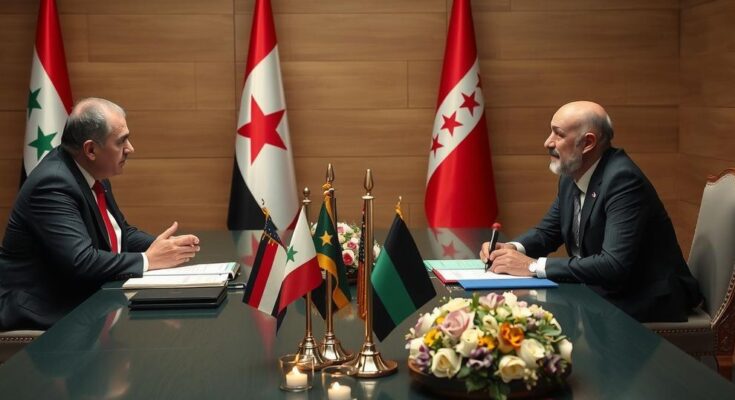U.S., Turkey, and Arab officials have agreed to support a peaceful transition in Syria during talks in Jordan. Key discussions emphasized the need for an inclusive government while preventing chaos similar to Libya’s post-conflict situation. Concerns remain regarding the commitment of rebel groups like HTS to a peaceful transition, highlighting the necessity for coordinated efforts among regional actors.
Officials from the United States, Turkey, and several Arab nations have convened in Jordan to endorse a peaceful transition process in Syria. Jordanian Foreign Minister Ayman Safadi emphasized the collective resolve to prevent Syria from spiraling into chaos. In confirmation of the talks, U.S. Secretary of State Antony Blinken disclosed that direct communication with the rebel group Hayat Tahrir al-Sham (HTS) had occurred. A joint statement called for an inclusive Syrian government that values minority rights and combats terrorism.
During this summit, Iraqi Foreign Minister Fuad Hussein voiced regional concerns about Syria’s future amidst the potential for a chaotic legacy akin to Libya post-Gaddafi. Turkish Foreign Minister Hakan Fidan asserted the necessity of preserving and reforming existing Syrian institutions, cautioning against allowing terrorist entities to exploit the transition period. Despite HTS expressing a desire for an inclusive government, skepticism persists regarding its commitment to forsake its violent past.
Sekretary Blinken reiterated ongoing contact with HTS, notably concerning the fate of missing American journalist Austin Tice, although HTS remains designated as a terrorist organization by the U.S. Notably absent from the Jordan discussions were representatives from Syria as well as key supporters of President Bashar al-Assad, namely Iran and Russia. With multiple outside powers having influenced the Syrian conflict, it is vital for emerging political structures to achieve both internal and external coherence to secure a better future for Syrians.
The ongoing conflict in Syria has drawn in myriad external forces, creating a complex landscape with significant implications for the region’s stability. Following the uprising against President Bashar al-Assad’s regime, the resultant civil war saw the emergence of various rebel factions, including HTS. The recent shift towards discussing possible political transitions signifies a potential for change, although skepticism remains due to the past actions of these groups. The need for a unified approach among regional powers and the recognition of minority rights are paramount in mitigating fears of sectarian division.
In summary, the meeting in Jordan underscored a critical commitment by the U.S., Turkey, and Arab nations to foster a peaceful transition in Syria. By advocating for an inclusive government and preserving existing institutions, regional leaders are striving to navigate the complexities of Syrian politics. However, the path forward requires earnest cooperation and vigilance against extremist elements to ensure that the aspirations for peace and stability are ultimately realized.
Original Source: www.bbc.com




